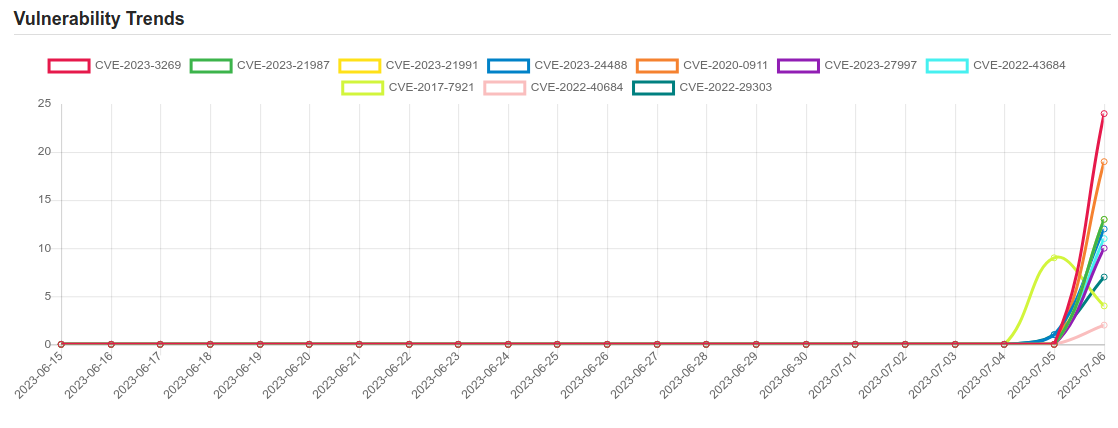Daily Vulnerability Trends: Fri Jul 07 2023

| CVE NAME | CVE Description |
| CVE-2023-31248 | No description provided |
| CVE-2023-36934 | No description provided |
| CVE-2021-29256 | No description provided |
| CVE-2023-2136 | No description provided |
| CVE-2023-3128 | No description provided |
| CVE-2020-0911 | An elevation of privilege vulnerability exists when Windows Modules Installer improperly handles objects in memory, aka ‘Windows Modules Installer Elevation of Privilege Vulnerability’. |
| CVE-2023-27997 | A heap-based buffer overflow vulnerability [CWE-122] in FortiOS version 7.2.4 and below, version 7.0.11 and below, version 6.4.12 and below, version 6.0.16 and below and FortiProxy version 7.2.3 and below, version 7.0.9 and below, version 2.0.12 and below, version 1.2 all versions, version 1.1 all versions SSL-VPN may allow a remote attacker to execute arbitrary code or commands via specifically crafted requests. |
| CVE-2022-43684 | ServiceNow has released patches and an upgrade that address an Access Control List (ACL) bypass issue in ServiceNow Core functionality. Additional Details This issue is present in the following supported ServiceNow releases: * Quebec prior to Patch 10 Hot Fix 8b * Rome prior to Patch 10 Hot Fix 1 * San Diego prior to Patch 7 * Tokyo prior to Tokyo Patch 1; and * Utah prior to Utah General Availability If this ACL bypass issue were to be successfully exploited, it potentially could allow an authenticated user to obtain sensitive information from tables missing authorization controls. |
| CVE-2017-7921 | An Improper Authentication issue was discovered in Hikvision DS-2CD2xx2F-I Series V5.2.0 build 140721 to V5.4.0 build 160530, DS-2CD2xx0F-I Series V5.2.0 build 140721 to V5.4.0 Build 160401, DS-2CD2xx2FWD Series V5.3.1 build 150410 to V5.4.4 Build 161125, DS-2CD4x2xFWD Series V5.2.0 build 140721 to V5.4.0 Build 160414, DS-2CD4xx5 Series V5.2.0 build 140721 to V5.4.0 Build 160421, DS-2DFx Series V5.2.0 build 140805 to V5.4.5 Build 160928, and DS-2CD63xx Series V5.0.9 build 140305 to V5.3.5 Build 160106 devices. The improper authentication vulnerability occurs when an application does not adequately or correctly authenticate users. This may allow a malicious user to escalate his or her privileges on the system and gain access to sensitive information. |
| CVE-2022-40684 | An authentication bypass using an alternate path or channel [CWE-288] in Fortinet FortiOS version 7.2.0 through 7.2.1 and 7.0.0 through 7.0.6, FortiProxy version 7.2.0 and version 7.0.0 through 7.0.6 and FortiSwitchManager version 7.2.0 and 7.0.0 allows an unauthenticated atttacker to perform operations on the administrative interface via specially crafted HTTP or HTTPS requests. |
| CVE-2022-29303 | SolarView Compact ver.6.00 was discovered to contain a command injection vulnerability via conf_mail.php. |
| CVE-2023-20185 | No description provided |
| CVE-2023-28121 | An issue in WooCommerce Payments plugin for WordPress (versions 5.6.1 and lower) allows an unauthenticated attacker to send requests on behalf of an elevated user, like administrator. This allows a remote, unauthenticated attacker to gain admin access on a site that has the affected version of the plugin activated. |
| CVE-2023-2868 | A remote command injection vulnerability exists in the Barracuda Email Security Gateway (appliance form factor only) product effecting versions 5.1.3.001-9.2.0.006. The vulnerability arises out of a failure to comprehensively sanitize the processing of .tar file (tape archives). The vulnerability stems from incomplete input validation of a user-supplied .tar file as it pertains to the names of the files contained within the archive. As a consequence, a remote attacker can specifically format these file names in a particular manner that will result in remotely executing a system command through Perl’s qx operator with the privileges of the Email Security Gateway product. This issue was fixed as part of BNSF-36456 patch. This patch was automatically applied to all customer appliances. |
| CVE-2023-27217 | A stack-based buffer overflow in the ChangeFriendlyName() function of Belkin Smart Outlet V2 F7c063 firmware_2.00.11420.OWRT.PVT_SNSV2 allows attackers to cause a Denial of Service (DoS) via a crafted UPNP request. |
A considerable amount of time and effort goes into maintaining this website, creating backend automation and creating new features and content for you to make actionable intelligence decisions. Everyone that supports the site helps enable new functionality.
If you like the site, please support us on “Patreon” or “Buy Me A Coffee” using the buttons below
To keep up to date follow us on the below channels.

